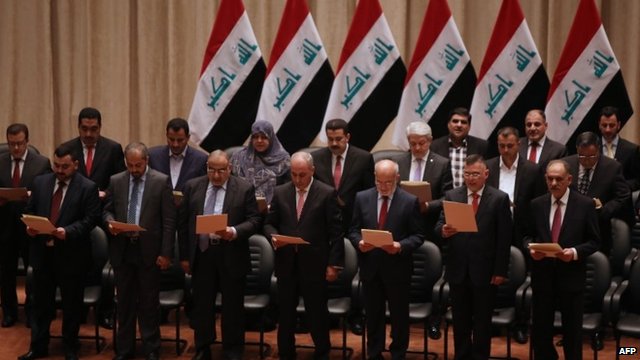Iraqi lawmakers approved a new cabinet on Monday but key security posts remained unfilled.
Iraqi lawmakers approved a new cabinet on Monday but key security posts remained unfilled.
New premier Haidar al-Abadi had been under heavy international pressure to form an inclusive government that could present a united front against the Takfiri group ISIL.
The crucial parliament session opened to chaotic scenes, with speaker Salim al-Juburi struggling to maintain order and many MPs absent.
Eventually, 289 out of 328 lawmakers showed up and helped approve three deputy prime ministers and 21 ministers, but key posts -- including the interior and defense posts -- remain unfilled.
Abadi has asked for a week to fill them, and will run the ministries in an acting capacity until then. The last government also started with key positions empty and acting ministers ended up filling them for four years.
In a sign of the delicate balancing act required to paper over Iraq's deep sectarian and factional divides, three fierce rivals were also approved as the country's new vice presidents: former premiers Nuri al-Maliki and Iyad Allawi, and ex-parliament speaker Osama al-Nujaifi.
Iraq's Kurds -- who control an autonomous region and are at odds with Baghdad over issues including territory and division of the country's vast natural resources -- only took part at the last minute.
Their MPs were still waiting for word from their leaders in the northern city of Sulaimaniyah when parliament opened, and were waiting in the cafeteria.
They later arrived in the chamber, and Kurdish MP Ala Talabani announced during the session that the Kurds would participate in the government on a three-month trial period. They received two ministries and a deputy premiership.
REACTIONS
UN Secretary General Ban Ki-moon welcomed the new government as a "positive step" but urged politicians to quickly choose new defense and interior ministers.
US Secretary of State John Kerry also praised the "new and exclusive" Iraqi cabinet as a "major milestone".
"Now is the time for Iraq's leaders to govern their nation with the same vision and sense of purpose that helped to bring this new government together," he said, speaking a few hours before leaving on a mission to solidify the front against ISIL.
Meanwhile, the new UN human rights chief Prince Zeid Ra'ad Al Hussein said ISIL atrocities promised only a "house of blood" for those living under their rule, while the head of Egypt's prestigious Al-Azhar religious institution also condemned the Takfiri group.